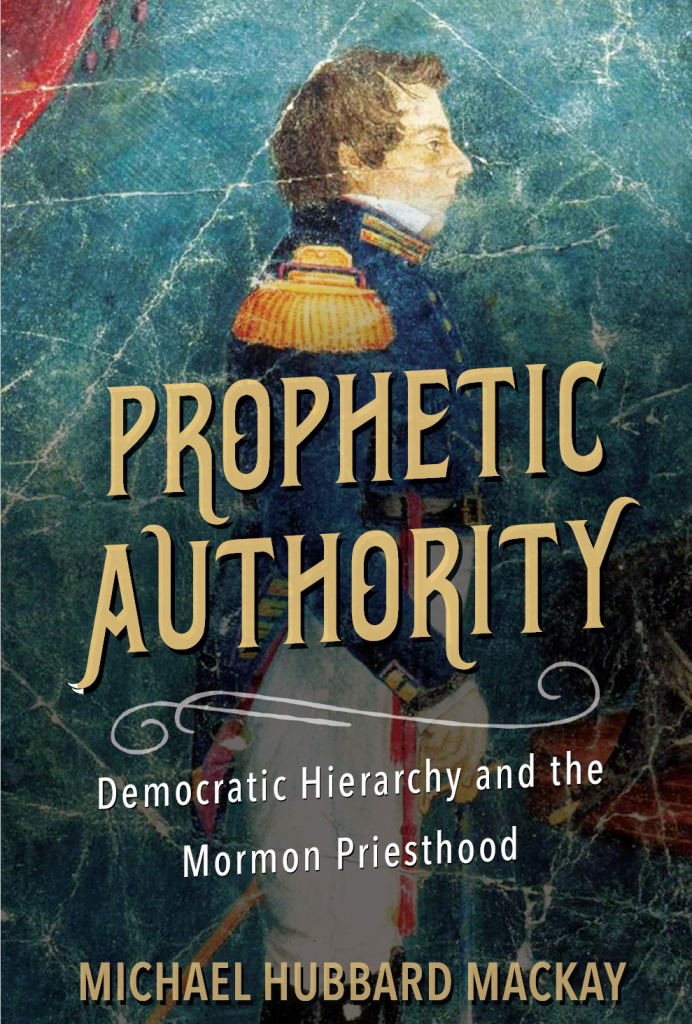
I’ve known Michael MacKay for a while now. Sometimes our research interests have followed adjacent lanes. He is smart, and willing to approach topics that have challenged some of our best thinkers, and he has done so in innovative ways. His work is always notable. Mike’s recently published Prophetic Authority, more than any his previous work, hits on topics that have captivated me—Latter-day Saint constructs of authority, priesthood, and ecclesiology. As one would expect with the best work on any topics, I found myself sometimes disagreeing emphatically, then, and more often, concurring with its insightful and piercing presentation.
Michael Hubbard MacKay, Prophetic Authority: Democratic Hierarchy and the Mormon Priesthood (Chicago and Urbana: University of Illinois Press, 2020).
As stated in his intro, Mike wants to engage some of the most important previous scholarship, viz., Hatch, Flake, Givens, and Prince. If you haven’t read those works, some of the argumentation, at least early on is going to feel a little unclear. That is okay. This doesn’t seem like a volume that is going to be advertised at General Conference. Mike goes on to craft narratives of developmental authority within Joseph Smith’s religious world—ones that whip centrifugally outward while the gravity of his own being keeps objects within (sometimes unsteady) orbit. He sums up his argument up on page 4: “Early Mormonism was neither the unfettered populism suggested by Hatch nor the autocracy that Smith’s critics accused it of being. Rather, it was a hierarchical democracy, its new polity tailor-made to meet the needs of a post-Enlightenment United State that struggled to define what religion would be in the wake of disestablishment.”
I’ll readily concede that in my published work I have made arguments about priesthood and authority while sort of waving my hands a bit regarding the first decade after translation. I’ve found William Smith’s analysis of priesthood development very compelling and useful and generally point to that. Inasmuch as Mike strikes out away from some of that, I found my self nodding less in agreement and questioning more [n1].
I’m also somewhat discomfited by Mike’s use of anachronism. I would generally deprecate any reading of early seer stone use that invoked the Urim and Thummim, or discussions of “saving ordinances” absent massive qualifications. Mike, however, is clearly steeped in the documents of the period and knows what he is doing. He is making arguments focused on certain periods, but that also extend far beyond, and consequently butt up against and through later periods where different ways of understanding the events did hold sway. As this book is intended for audiences with critical backgrounds, I think this proves to be a fruitful approach. Still, keep an eye out.
So let’s dig into the fun stuff. Prophetic Authority is the best treatment I have read regarding the authority of church elders and the events at the Whitmer’s home, where the voice of the Lord called JS to action. Mike is right when states that these events were later overlooked as other narratives became useful and emphasized. His careful unpacking will benefit scholarship moving forward.
Similarly, Mike’s arguments regarding the various escalations of the Peter, James, and John narratives from Kirtland through to the post-martyrdom revisions to the Nauvoo Temple endowment liturgy is excellent. In fact it strikes me that the existence of this book, which deals quite directly (and constructively) with numerous tricky issues, including aspects of the temple that have historically been verboten for church employees, should be heralded as an important milestone not only in the field broadly construed, but also for BYU Religious Education, where Mike is employed.
I’m still chewing on Mike’s arguments about early apostolic authority in the church (i.e., apostles before the calling of the Quorum of the Twelve in 1835), but I will say that this is essential reading for thinking through the topic. In fact, this is essential reading for anyone who is interested in all of the topics he treats. Not many books or articles will have me engaging them long after having read them. I’ll be rereading and citing it in my own work—no question. One powerful assertion of the book seems undeniable: JS’s restoration was not about a particular moment of angels laying on hands. It was about the revelations that narrate those stories. Prophetic Authority delves at the heart of them.
Structurally, the book has a brief intro after which Ch. 1 establishes the foundation for JS’s “prophetic authority.” Each subsequent chapter describes a period of narrative (and ecclesiastical) development. Chapters 2-5 focus largely on JS, with chapters 5-7 looking closely, and analytically at how those narrative ramify through the community even after JS’s death.
Happy reading!
__________________
- E.g., on p. 81 it seems to me that Mike is saying that the two priesthoods that are referenced in the revelation are two buckets of authority and function similar to the later “Aaronic” and “Melchizedek” priesthoods, when textually “priests” appears to be the lesser priesthood, and not as he says, an appendage to it. I could be misreading this.
Thanks, J. This is a helpful review.
Comment by David G. — July 9, 2020 @ 11:14 am
Yes, thanks J. Much appreciated.
Comment by Steve Fleming — July 9, 2020 @ 1:26 pm
Thanks, J. I read the book recently. Like you, I’m chewing on a lot of things. But what I’m chewing on mostly tastes good.
Comment by John G Turner — July 11, 2020 @ 7:54 pm